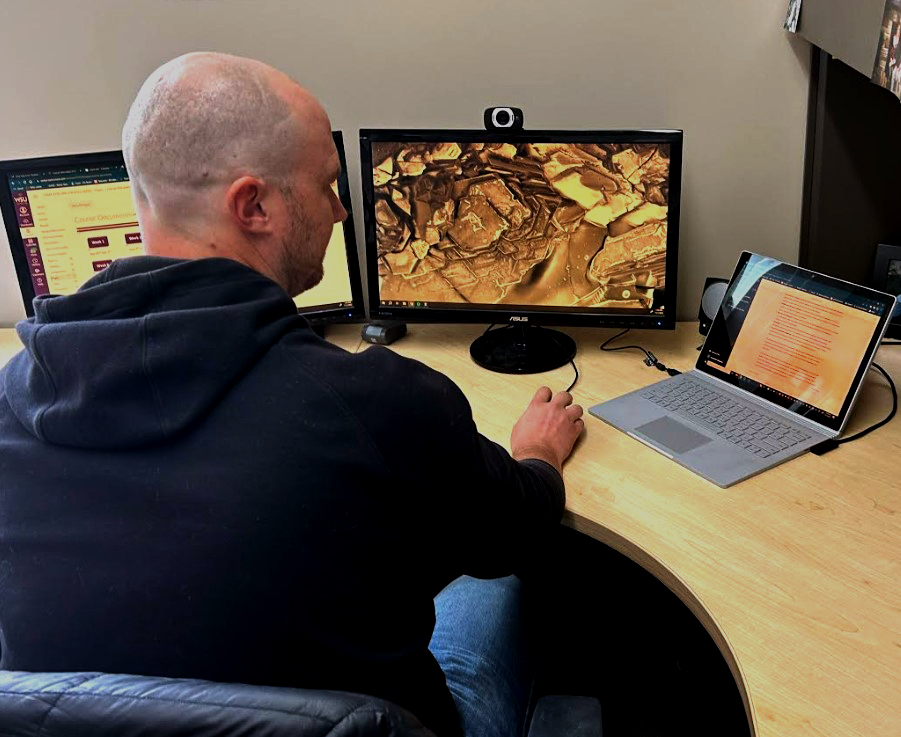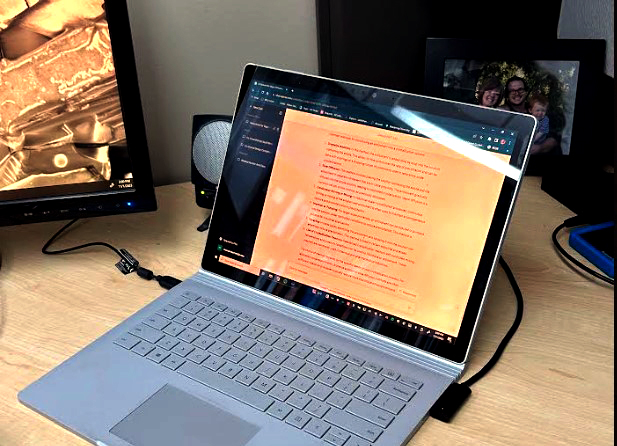“...what I'm specifically doing a lot in my class is having ChatGPT do some of the grunt work that ends up taking a lot of time that I actually would rather have my students not spend that time on and rather be able to spend their time on some critical thinking things.”
- Brandon Burnett, Department of Chemistry and BioChemistry Chair
ChatGPT in the College of Science
November 8, 2023
May 2025 Update: Learn more about AI resources at Weber State
The College of Science's Department of Chemistry and Biochemistry is utilizing the newest forms of technology to benefit the hands-on experiences of both professors and students here at Weber State University. The most recent implementation of technology is the newer idea of artificially intelligent think bots. ChatGPT 3.5 and 4.0 are the AI technology some professors in chemistry and biochemistry are using. In this article discover more about what is ChatGPT, how professors are using AI, the limitations, and their response to the controversy surrounding it in higher education.
What is ChatGPT? How are professors using AI? Are there limitations? How do they respond to the controversy?
How are professors using AI?
 Many universities across the country are using ChatGPT and have been for the past year. Weber State University is among these daring universities. Multiple departments among the colleges on campus are discovering what ChatGPT offers. The Department of Chemistry and Biochemistry professors, Brandon Burnett, also serving as department chair, Tracy Covey, Demetrios Pagonis, and the College of Sciences’ associate dean, Laine Berghout are utilizing ChatGPT in their fall semester classes. They use it for tasks such as research, grunt work, literature searches, and as a computer programming tool.
Many universities across the country are using ChatGPT and have been for the past year. Weber State University is among these daring universities. Multiple departments among the colleges on campus are discovering what ChatGPT offers. The Department of Chemistry and Biochemistry professors, Brandon Burnett, also serving as department chair, Tracy Covey, Demetrios Pagonis, and the College of Sciences’ associate dean, Laine Berghout are utilizing ChatGPT in their fall semester classes. They use it for tasks such as research, grunt work, literature searches, and as a computer programming tool.
Advocating that students use AI as an interactive textbook for research, follow up questions, and explanations, Burnett suggests that a student start their AI conversation with a very broad question related to their ultimate research goal. The student continues the "chat" by narrowing their questions down to the specific project question. This allows their interaction with ChatGPT to continually take in data to further its understanding of the subject. Thus, offering a better solution to the research topic. He also recommends students ask the AI “what questions do you have for me?” This question will assist in the process as well.
In Covey's personal research she is utilizing ChatGPT's vast data searches to assist in problem solving and academic literature searches. When Covey or her students ask the AI how it calculates a problem it will show a step by step process. Covey believes this, "is actually awesome, because if you're a student who wants to learn how to solve a problem, you can ask it to write all the steps out for you and it will show you." Understanding and following along with how to solve a problem is more ideal than "a program where you would stick in the question” to get a solution. Covey recommends asking the AI for step by step processes and has found that the AI is usually good about identifying the steps.
It's important to understand that Chat GPT is a secondary source like Wikipedia; it pulls its information from primary sources to create its own information. Burnett indicated that if he or a student wants to know what sources the program is pulling its information from then they have to “bully” it into giving the primary sources to them. Covey warns students, as we have learned from our interactions with Wikipedia, that the sources aren't always reliable. Some of the websites aren't even live anymore. The professors agree that the AI produces at best “B” letter grade work and it is up to the student to turn the grade into an “A”.
Are there limitations?
 Professors encourage students to not trust the information ChatGPT produces one hundred percent of the time because there are errors in some of its statements or conclusions. The ChatGPT program is a tool not a solution according to the professors. Students need to think critically about the information being presented, they need to learn the materials, and they need to do self calculations. But ChatGPT is an excellent time saver for assistance of the students' learning and initial research.
Professors encourage students to not trust the information ChatGPT produces one hundred percent of the time because there are errors in some of its statements or conclusions. The ChatGPT program is a tool not a solution according to the professors. Students need to think critically about the information being presented, they need to learn the materials, and they need to do self calculations. But ChatGPT is an excellent time saver for assistance of the students' learning and initial research.
Pagonis explains that the students' intellectual effort could be spent on interpreting tasks rather than spending time on creating data, with ChatGPT the time spent could be on understanding the figures it produces instead of the mass amounts of information it takes in.
Burnett, Pagonis, and other professors are also using ChatGPT in the generation of Python Computer coding. The AI assists in the creation and correction of said code for the student to create figures and calculate data for experiments and labs. It is important that students remember that ChatGPT needs context to the problem to accurately assist in the project. “It's a really great tool and again, it's a tool that they will likely always have moving forward. And if they can bring that to their job or to graduate school or wherever they go after they're done with us and have some of these skills and know what it can and can't do, I think it'll make them more marketable.” says Burnett.
“I see here an opportunity to use it (generative AI) as a teaching tool rather than resist it, because that's how it's going to be used when our students get out in the workforce. We can help them learn to be critical of what it's giving them.”
- Laine Berghout, College of Science Associate Dean
How do they respond to the controversy of using ChatGPT in education?
There is a discussion among faculty and staff at WSU about the uses and drawbacks of the ChatGPT technology, and how the uses are different per department. The AI can assist in the generation of art, literature, music, essays, poetry, and so much more. Some professors are proponents for the implementation of the tool, while others hold skepticism towards the AI’s potential for harm. Then there are professors who are in the gray area of the discussion. They understand both the good and bad of the application and agree there needs to be more discussion and discovery in regards to the technology for future uses.
Covey says “You can't just take it, copy it, and assume that's everything right. You got to check the information that's coming out of there. And I think that would be the next thing that I would focus on with students.”
The ultimate controversy and fear of ChatGPT in educational settings is that the AI will be used for nefarious works. However, cheating on homework and plagiarizing papers have always been an issue, with or without ChatGPT. Professors and educational institutions are always having to adjust to new technology, “if I am encouraging the use of ChatGPT... then it makes something like just purely handing in a long written piece... not an effective assessment tool anymore.” says Pagonis.
What is ChatGPT?
Chat GPT is a generative AI thinkbot where the user can hold a conversation, in the form of text entries, over the phone or on the computer. The discussion can be anything and everything the user can imagine. According to the article “ChatGPT explained: everything you need to know about the AI chatbot” written by Mark Wilson on the TechRadar site “ChatGPT is an AI chatbot that was initially built on a family of large language models (LLMs) collectively known as GPT-3… These models can understand and generate human-like answers to text prompts, because they've been trained on huge amounts of data.” This thinkbot has been programmed to answer many various forms of questions based on the information the user puts into the chat. Chat 4.0 is the faster, premium, and more updated than the 3.5 free version.
Demetrios Pagonis, assistant professor, compared it to an electronic calculator. Before the electronic calculator there were logarithmic tables with values that related to sine and cosine for trigonomic functions to calculate equations, “you would go look up what sine of some angle was in the sine table to get the answer to five digits. Then the pocket calculator comes along and now you're just getting that piece at the push of a button… that doesn't mean that people stopped knowing math, right? It just eliminated some of the steps that had traditionally been part of the process of doing certain calculations.”
ChatGPT, for these professors, has now eliminated extra steps in the process of researching and performing experiments. Some might say the grunt work.
ChatGPT and the use of other generative AI has become more and more prevalent in daily life within the past two years. As new methods for using ChatGPT arise within educational settings there will continue to be discussion on the benefits and necessary boundaries. The Department of Chemistry and Biochemistry, along with other departments across campus, will continue to grow with the use of this technology and prepare its students for the future of artificial intelligence. They feel with proper AI instruction from professors, continued positive relationship development between faculty and students, and updates to detective software, the hope is that ChatGPT positives will outlast the negatives. We invite you to reach out to faculty or, even better - take a class, participate in undergraduate research, and get involved!

Brandon Burnett
Department Chair,
Associate Professor

Tracy Covey
Associate Professor

Demetrios Pagonis
Assistant Professor

Laine Berghout
Associate Dean, Professor
Author:
Hannah Moore, College of Science Marketing and Communications Intern
Contact:
Ali Miller, College of Science
marketing and communications manager
amiller@weber.edu